| Srl | Item |
| 1 |
ID:
161324
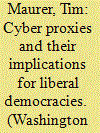

|
|
|
| 2 |
ID:
113517
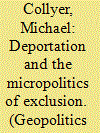

|
|
|
|
|
| Publication |
2012.
|
| Summary/Abstract |
The forced removal of foreign nationals has been a relatively uncommon occurrence in liberal democracies, at least since the 2nd World War. This can be explained by both the inherent violence of this process, which raises widespread public opposition, and by the geopolitical difficulties it raises, as there must be agreement of both countries concerned. In recent years these problems appear to have been partially overcome and since 2005 a 'deportation turn' is evident across the European Union as deportations increase. This paper focuses on the international dimension to this increase, following work investigating deportation as an essentially biopolitical process of international governance of populations. This approach is developed in an analysis of the geopolitical impacts of that management process. The paper uses empirical research with Sri Lankan migrants who left the UK either as a result of force or voluntary returns policies to explain this development. It identifies the changing strategy of the deportation process, particularly recent attention to the negotiation of bilateral and multilateral readmission agreements and the role of international organisations as mediators as key contributions to an explanation for the rise in deportations.
|
|
|
|
|
|
|
|
|
|
|
|
|
|
|
|
| 3 |
ID:
142995
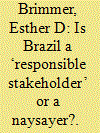

|
|
|
|
|
| Summary/Abstract |
This current order rests on promoting and maintaining five pillars: peace and security; the market economy, especially international trade and investment; human rights and humanitarian action; sustainable development; and global spaces. Each of these areas is large and complex, and the emergence of new powers is likely to alter that system but not destabilize it.
|
|
|
|
|
|
|
|
|
|
|
|
|
|
|
|
| 4 |
ID:
181173
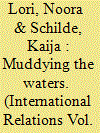

|
|
|
|
|
| Summary/Abstract |
Advanced liberal democratic states interdict migrants on the High Seas global commons. Why have liberal states engaged in this practice over the past four decades? Deterrence and humanitarian rescue explain part of this puzzle, but they are insufficient for understanding the patterns and justifications for migrant interdiction on the High Seas. Tension between states promoting international human rights and circumventing those obligations challenges expectations of liberal state behavior. International relations scholars must incorporate the global commons when explaining state behavior; ungoverned areas create exceptional zones for states to partially suspend their standard operating procedures to execute policies furthering their interests. We argue that liberal states use the regulatory gray zones of the High Seas to ‘muddy the waters’ in order to advance their security interests. States with the highest domestic refugee protections have incentives to circumvent their own obligations, which vary over time with changes to domestic asylum laws.
|
|
|
|
|
|
|
|
|
|
|
|
|
|
|
|
| 5 |
ID:
133750


|
|
|
|
|
| Publication |
2014.
|
| Summary/Abstract |
Both the Russian public and its elites were taken by surprise by the fact that Russia has become an immigration country. It has resulted in widespread anti-immigrant sentiments and inconsistency in government actions. Russian immigration politics, as well as immigration politics in liberal democracies of the West, are characterised by a wavering between protectionist and liberal laissez faire approaches. This leads to a mismatch between public rhetoric and legal decisions. However, two features seem to make the Russian situation specific: open borders with most of the countries of the former Soviet Union and omnipresent corruption. Corruption results in a discrepancy between formal (legal) decisions and informal (illegal) practices.
|
|
|
|
|
|
|
|
|
|
|
|
|
|
|
|
| 6 |
ID:
120539
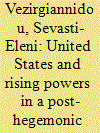

|
|
|
|
|
| Publication |
2013.
|
| Summary/Abstract |
The changing geopolitical landscape is fraying the fabric of US hegemony and compromises the current structures of global order tied to US supremacy. Emerging powers from the 'developing' world, such as China, India and Brazil, are increasingly challenging the US-based order through their individual and collective actions on economic and development governance. They see themselves as lacking a significant stake in the system and have different values than traditional US allies which tend to be advanced liberal democracies.
This article examines how the US is attempting to manage the challenge to its position of primacy in the global order. The main argument is that the US has been slow to recognize this threat and is still ambivalent about how to tackle it. It appears that at this stage the US wants to share the burdens of governance with emerging powers, encouraging them to play the role of 'responsible stakeholders'.
At the same time, however, the US does not wish to relinquish its ability to act unilaterally or to be the main voice in established institutions, such as the UN Security Council or the International Monetary Fund. For this reason, the US has preferred to encourage the involvement of emerging countries in governance through informal settings like the G20, while resisting or being at best lukewarm about the reform of formal governance structures.
The article concludes that if the US continues to pursue this strategy global order is likely to become more fragmented, with formal institutions increasingly losing their power and relevance; this, in turn, will diminish US power and influence.
|
|
|
|
|
|
|
|
|
|
|
|
|
|
|
|